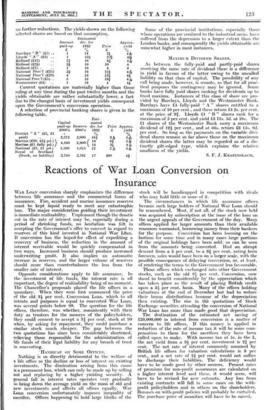IIANDreAP oSr SOME OFFICES .
Nothing is so directly detrimental to the welfare of a life office as the decline or loss of interest on existing Investments. The diminution arising from this cause is a permanent loss, whit can only be made up by selling out and replacing. by a higher yielding security. A general fall in interest rates operates very gradually .bring down the average yield on the mass of old and new investments and affects all offices equally. War Loan conversion unfortunately imposes inequality of sacrifice. Offices happening to hold large blocks of the stock will be handicapped in competition with rivals who may hold little or none of it.
The circumstances in which life assurance offices became such large holders of National War Loan should be remembered. Most, if not all, of the stock now held was acquired by subscription at the issue of the loan on the urgent appeals of the Government of the day. Many offices applied for larger amounts than their available resources warranted, borrowing money from their bankers for the purpose. Conversion has been looming on the horizon for some time and in many cases large portions of the original holdings 'have been sold; as can be seen from the amounts being converted. Had an abrupt descent from a 5 per cent. to a 81 per bent, rating been foreseen, sales would have been on a larger scale, with the possible consequence of delaying -Conversion, or, at least, of rendering the terms to the Government less favourable.
Those offices which exchanged into other Government stocks, such as the old- 31 per cent. Conversion, now stand to benefit considerably by* the appreciation which has taken place as the result of placing British credit upon a 31 per cent. basis. Many of the offices holding valuations at the end of December last had to reduce their bonus distributions because of the depreciation then existing. The rise in the quotations of Stock Exchange securities attending the conversion of National War Loan has more than made good that depreciation.
The destination of the estimated net saving of 128,000,000 in interest from conversion is a matter of concern to life offices. If this money is applied in reduction of the rate of income tax it will be some com- pensation to them for the sacrifices they have been called upon to make. With income tax at 5s. in the the net yield from a 81 per cent, investment is 21 per cent. The net rate of interest commonly assumed by British life offices for valuation calculations is 8 per cent., and a net rate of 2i per cent, would not suffice to discharge their liabilities. The deficiency would have to be made good by other sources. Present rates of premium for non-profit assurances are calculated on a higher interest level and these, it would seem, will have to be revised for new entrants. Any loss from, existing contracts will fall in some cases on the with- profit policyholders and in others on the shareholders. Bonuses on with-profit policies will probably be curtailed. The purchase price of annuities will have to be raised.














































 Previous page
Previous page